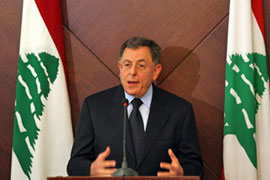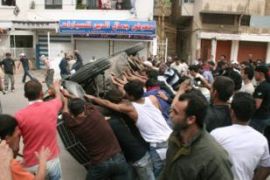An army official in Tripoli said government supporters had fought loyalists of an Alawite sect with links to Hezbollah in the Bab al-Tebbaneh, Kobel and Jabal Mohsen neighbourhoods.
“One woman has died in her house near Bab al-Tebbaneh,” he said, adding that about 7,000 people had fled the fighting.
He said that several people had been wounded in the fighting.
Army challenged
Zeina Khodr, Al Jazeera’s correspondent in Tripoli, said some members of the Alawite community had told her that pro-government supporters had started the fighting, although the claim could not be independently verified.
“According to the Alawites, the aim [of the government supporters] is clearly to show their power in Tripoli because they were clearly defeated in Beirut [by the opposition in recent days].”
She said the army faced a challenge in remaining neutral for the benefit of all Lebanese people.
“The army is in a very difficult position – if it does attack one party the army may split along sectarian lines,” she said.
Opposition fighters had earlier seized much of Beirut after battles with government supporters.
Lebanese police have said that 44 civilians have been killed and 129 others injured in the fighting.
But the capital is now coming under the control of the army after opposition forces were ordered to stand down by their commanders.
Hezbollah, which heads the opposition, said it would end its takeover of west Beirut on Saturday, after the army overturned government measures against them.
However, the opposition said it reserves the right to lead a campaign of civil disobedience until its political demands are met.
Hezbollah network
The fighting erupted after the government said it would take action against Hezbollah’s communications network
The government also suspended the head of security at Beirut airport, citing his alleged sympathies to Hezbollah.
|

Who’s who in Lebanese politics |
But Hezbollah said any action against its communications network, which played a crucial role in the group’s 34-day war with Israel in 2006, was tantamount to declaring war.
It also called for the airport chief to be reinstated.
The violence that followed was the worst internal fighting since Lebanon’s 1975-90 civil war.
Government concessions
After fierce fighting in Beirut, an army statement on Saturday said Brigadier-General Wafiq Shqeir, the head of security at the airport, would remain in his post “pending an investigation”.
“As for the telecommunications network, the army will look into the issue in a manner that is not harmful to the public interest or the security of the resistance”, it said, referring to Hezbollah.
The military’s action followed a televised address by Fouad Siniora, the Lebanese prime minister, in which he accused Hezbollah of staging a coup, calling the group’s takeover a “poisonous sting” to democracy.
 |
Siniora said Hezbollah’s weapons could no
longer be considered legitimate [AFP] |
In his speech, Siniora’s first public reaction to Hezbollah’s takeover of west Beirut, he said Hezbollah’s weapons could no longer be considered legitimate as they had been turned on Lebanese citizens.
“Hezbollah must realise that force of arms will not scare us or make us retreat,” he said.
But analysts questioned what the government would be able to do about disarming Hezbollah.
Commenting on Siniora’s speech, Hisham Jaber, a former Lebanese army general, told Al Jazeera: “For Hezbollah to give the government its weapons is a joke – the opposition does not trust this government.”
Jaber said: “The army would risk being divided and they are not prepared to defend any government. The army is not supposed to protect the government.”
Washington has pointed the finger at Iran and Syria – both of which back Hezbollah – for the violence, saying they must be held to account.
“The United States is consulting with other governments in the region and with the UN Security Council about measures that must be taken to hold those responsible for the violence in Beirut accountable,” the White House said.



